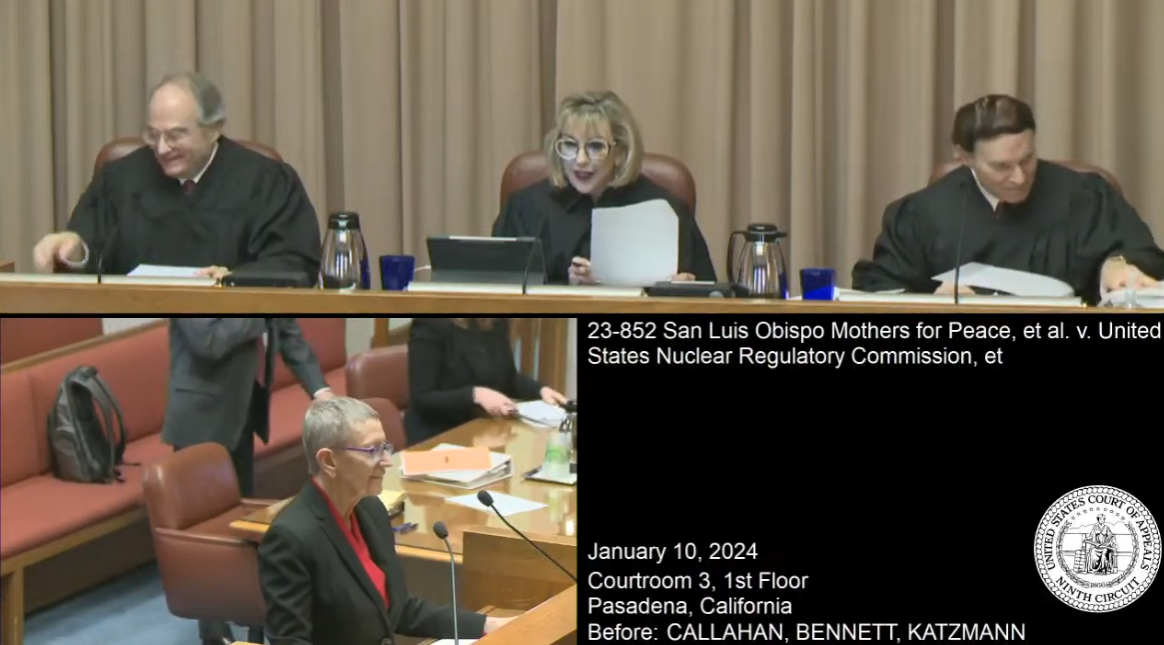
In the first courtroom action for a lawsuit opposing a life extension of California’s last nuclear plant, federal judges on Wednesday asked if the case belonged in their court and whether keeping it there could unleash a tide of new environmental lawsuits.
“I’m trying to decide the floodgate here,” said Circuit Judge Consuelo Callahan, an appointee of President George W. Bush who led Wednesday’s three-judge panel and wanted to know why an environmental coalition headed by San Luis Obispo Mothers for Peace did not file its lawsuit in a lower court.
Callahan dominated Wednesday’s proceedings, speaking far more than her colleagues Judge Mark Bennett, an appointee of President Donald Trump, and Gary Katzmann, an appointee of President Barack Obama.
Diane Curran, lawyer for the environmentalists, told Callahan the groups filed in the Ninth Circuit because the Nuclear Regulatory Commission in 2023 ended up “throwing a whole rule out the window” when it gave Pacific Gas & Electric (PG&E), operator of the Diablo Canyon Nuclear Plant, an exemption to an NRC requirement to which it was not entitled.
NRC, Curran said, did not justify the exemption as the law required. If it had, the environmentalists might first have challenged the justification in the lower U.S. district court.
The judges did not say Wednesday when they would rule in the case, which snowballed out of California’s 2022 decision to revoke a 2018 ban on keeping Diablo Canyon Nuclear Power Plant, in Avilla Beach, Calif., open beyond 2025. The ban prompted plant operator PG&E to retract a 2009 license renewal application with the Nuclear Regulatory Commission, ultimately giving the environmentalists ammunition for the current lawsuit. In 2022, Diablo Canyon received about $2 billion in federal and state bailouts.
Diablo Canyon Unit 1’s license will turn 40 and expire on Nov. 2, 2024. Unit 2 will catch up on Aug. 26 2025. NRC has said it might not finish with PG&E’s application for about two years, a month or so after Unit 2’s license expires.
During Wednesday’s roughly hour-long argument, Callahan focused most of her questions on the environmentalists’ logic that NRC’s 2023 exemption was illegal.
Callahan also asked the federal government’s attorney how, hypothetically, the Ninth Circuit could vacate NRC’s Diablo Canyon exemption without unleashing a “parade of horribles” that might get the agency sued every time it issued an exemption someone did not like.
NRC has argued, and argued again Wednesday through Eric Michel, a senior commission attorney, that it can grant exemptions without triggering a public hearing that could be appealed to court.
These exemptions, Michel said, are allowed even if they keep a nuclear plant open after its operating license’s fortieth year, the legal maximum before the commission must conduct a series of reviews and gather public input about further plant operations.
PG&E filed for a life-extension in November and NRC docketed the application Dec. 19, ahead of a Dec. 31 deadline the commission set in March. So, NRC marked the application as timely filed, giving PG&E an exemption to a 1991 commission rule that requires licenses to file for renewal at least five years before their licenses lapse and, in the process, permission to keep Diablo Canyon online for at least as long as it takes the commission to review the license-extension application.
Such exemptions, Curran said Wednesday in court, are supposed to be available only if the NRC determines it could reasonably complete required safety and environmental reviews and public hearings required by the 1991 rule to extend a plant’s operating license beyond the federal maximum of 40 years.
And in March, when NRC said PG&E could have an exemption if it filed for renewal by Dec. 31, the commission did none of those things, Curran said.
Callahan then asked Curran what NRC’s exemption should have said to comply with the 1991 rule.
“It had to say magic words that are in every other exemption [and] the magic words are: ‘we expect that if the application is filed by such and such a date, we will have sufficient time to complete the safety review, the environmental review and the hearing process,’” Curran said.
“These exact words are used in every other exemption decision,” said Curran. “They don’t make that finding here.”